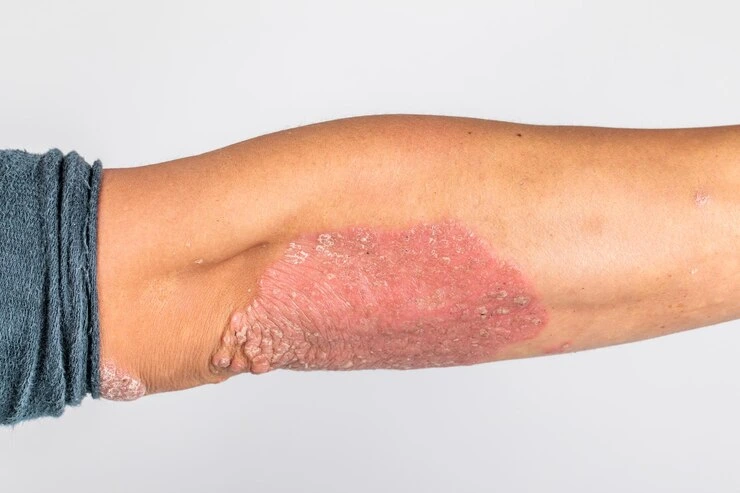Psoriasis is a challenging skin condition, causing itching, redness, patchiness, cracking, and inflammation. It can even lead to silver-colored plaques and skin bleeding. In Ayurveda, it’s known as “Kitibha,” often linked to imbalances in Vata Dosha and Kapha Dosha. Timely intervention is crucial to prevent its worsening. Opting for Psoriasis Ayurvedic Treatment is essential. At Raha Ayurveda, we’ve successfully treated numerous patients with this condition, offering effective relief through Ayurvedic practices. What triggers psoriasis is a major question that arises, this blog explores the answer to this question.
Also read:- Skin Disorders Ayurvedic Treatment
What Triggers Psoriasis?
Factors contributing to the development of Psoriasis vary, but the primary causes include:
-
Dietary Habits
-
Following a poor or unhealthy diet, characterized by frequent consumption of junk, processed, or stale food, can elevate the risk of psoriasis. According to Ayurveda, the adage “you are what you eat” holds true. Such dietary choices lead to toxin accumulation within the body, potentially manifesting as various skin and digestive ailments.
-
-
Use of Chemical-Based Products
-
Regular usage of beauty or general products laden with chemical ingredients can exacerbate skin disorders. These products tend to clog skin pores, impeding sweat release and resulting in dry, cracked, or irritated skin.
-
-
Weakened Immune System
-
Psoriasis being an autoimmune condition, individuals with compromised immune systems are more susceptible. In this ailment, immune cells erroneously target healthy skin cells instead of foreign substances, precipitating the disease’s onset.
-
-
Stress
-
Excessive stress serves as a catalyst for numerous health issues, including psoriasis. The intricate connection between mind and body underscores how distress and hypertension can provoke psoriasis flare-ups.
-
-
Environmental Factors
-
Environmental elements play a significant role in psoriasis. Factors like humidity, unclean or sweaty clothing, and poor hygiene contribute to the exacerbation of this skin disorder.
-
-
Hormonal Imbalance
-
Hormonal fluctuations, particularly during puberty and in women, can trigger psoriasis. Elevated estrogen levels prompt rapid skin cell regeneration, particularly post-menstruation, potentially leading to the condition’s onset.
-
How can one recognize if they have been diagnosed with this condition?
The indicators of psoriasis may vary from individual to individual depending on the type of psoriasis they have. However, common symptoms include:
-
Formation of plaques and scaly skin.
-
Presence of skin rashes.
-
Itching and redness.
-
Appearance of light black, brown, or white patches on the skin.
-
Sensation of burning.
-
Occurrence of dry or cracked skin.
-
Feelings of anxiety and discomfort.
-
Pain and inflammation in the joints.
If any of these symptoms are experienced, it is advisable to seek medical assistance to prevent potential complications.
Various methods are available for managing psoriasis, with Ayurvedic treatment being widely regarded as one of the most effective approaches.
Also read :- Ayurvedic Approach to Managing Psoriasis

Here are some Ayurvedic recommendations for preventing psoriasis:
-
Dietary Considerations
-
Pay attention to your diet as it directly impacts your body and mind. According to Ayurveda, consuming fresh and healthy foods is crucial. Incorporate items like broccoli, cauliflower, berries, grapes, and green leafy vegetables into your diet to help prevent psoriasis.
-
-
Skin Moisturization
-
Keep your skin adequately moisturized to prevent skin disorders. Opt for herbal moisturizers over chemical-based ones. Natural options like coconut oil, black seeds oil, lavender oil, and castor oil act as effective natural moisturizers that protect the skin.
-
-
Yoga and Meditation
-
Engage in yoga and meditation to alleviate stress and tension associated with psoriasis. Practices like Pranayama can help reduce psychological discomfort and alleviate psoriasis symptoms.
-
-
Hygiene Maintenance
-
Maintain good hygiene practices by taking a daily lukewarm water bath. Use natural soaps containing Ayurvedic oils, charcoal, and herbs for handwashing. Consider adding Epsom salt to lukewarm water for skin cleansing. These adjustments can aid in managing the condition.
-
In contrast, here are some things to avoid:
-
Dietary Restrictions
-
Avoid foods known to trigger psoriasis flare-ups. Certain items like wheat containing gluten, eggs, meat, seafood, processed, and junk food should be eliminated from your diet.
-
-
Smoking and Alcohol Consumption
-
Refrain from smoking cigarettes or consuming alcohol as these habits increase susceptibility to infections, which are often associated with psoriasis.
-
-
Dairy Product Consumption
-
Limit dairy product intake as they can contribute to psoriasis development. Dairy items such as milk, cheese, yogurt, butter, cream, and milk-based sweets should be avoided. However, clarified butter (desi ghee from cow) is beneficial for psoriasis treatment as it aids in eliminating body waste products.
-
-
Avoid Chemical-based Products
Steer clear of products containing harsh chemicals, as they can cause skin irritation, redness, and infection, ultimately exacerbating psoriasis. These products may clog skin pores, impeding sweat elimination.
Conclusion
Understanding what triggers psoriasis is crucial for effective management. At Raha Ayurveda we treat psoriasis by understanding the root cause. We use a combination of traditional ayurvedic and modern medical techniques to target the underlying cause of psoriasis. Our personalized treatment plans include dietary changes, lifestyle changes, and herbal medicines. We also provide stress management techniques to help patients cope with the physical and emotional aspects of the condition.
Also read:- Best Ayurvedic Treatment for Psoriasis

Leave a Reply